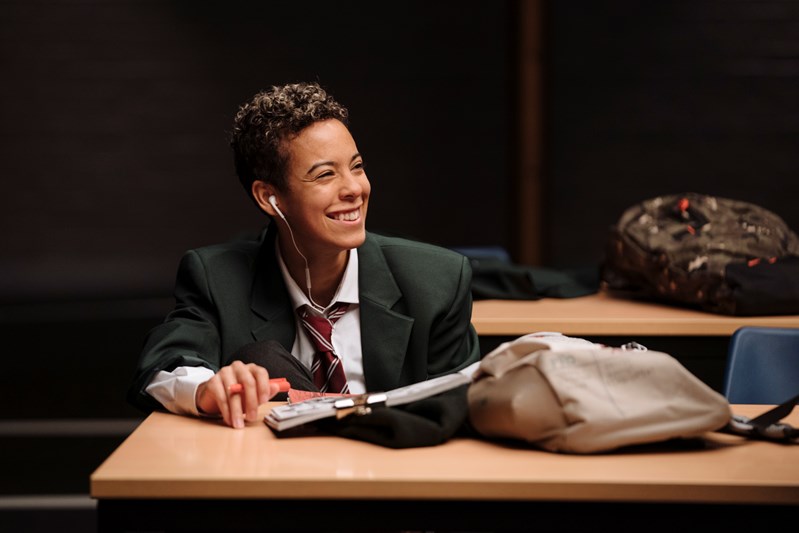'Unimaginably funny, achingly moving, brilliantly realistic': Theatre Centre's 'Birds and Bees'
Harriet Clifford
Monday, December 7, 2020
‘Birds and Bees’ by Charlie Josephine for the Theatre Centre has been designed as a resource for KS4 Drama, English, and PSHE students and is available now. We review the performance.
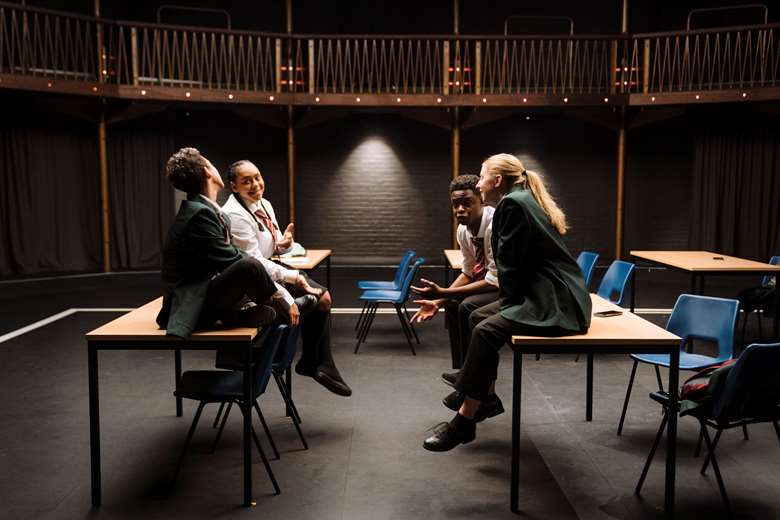
Helen Murray

With a title like Birds and Bees, you might expect this production to be about sex. Your assumption would be partially correct, as this new filmed play has been written by Charlie Josephine for students to help them think about the complicated nature of relationships.
However, far from being a cringey, updated but equally patronising version of ‘Let’s all put condoms on bananas’, Birds and Bees is an unimaginably funny, achingly moving, brilliantly realistic portrayal of what it’s like to be a teenager in today’s world.
It’s about sex, but it’s also about identity, consent, mental health, exam pressure, suicide, friendship, loyalty, pornography, feminism, youth empowerment, social media, and everything else that mixes together into the intoxicating concoction we call living. As we all know, sex is never just sex.
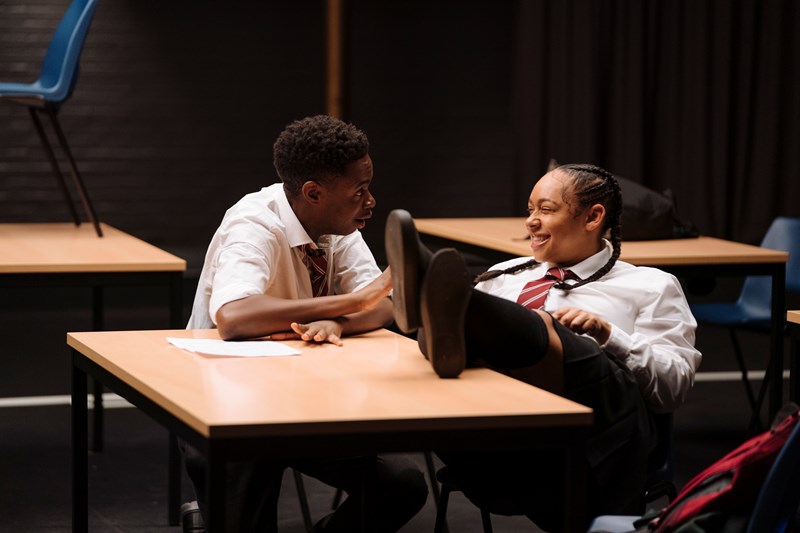
Conception
Birds and Bees was conceived as a play before lockdown but has been turned into a film directed by Rob Watt and produced by Steven Atkinson. As well as the hour-long production – much more than a staged play captured on camera – teachers can access 18 lesson plans (6 for Drama, 6 for PSHE, 6 for English) to extend the resource further.
It’s set during a school detention, in which Aarron (Ike Bennett), Leilah (Narisha Lawson), Maisy (Ida Regan), and Billy (EM Williams) are forced together following an incident involving explicit photographs being sent around school. Aarron and Leilah, a couple seemingly reeling from an off-screen argument, are close with both students caught up in the scandal.
As punishment for disrupting the assembly about it, they’ve all been told to co-write a speech to discourage their peers from taking or sharing explicit pictures. Reluctant and divided, they debate the complex questions around ‘who is to blame’, doing so in a way that feels organic, rather than staged to make an educational point.
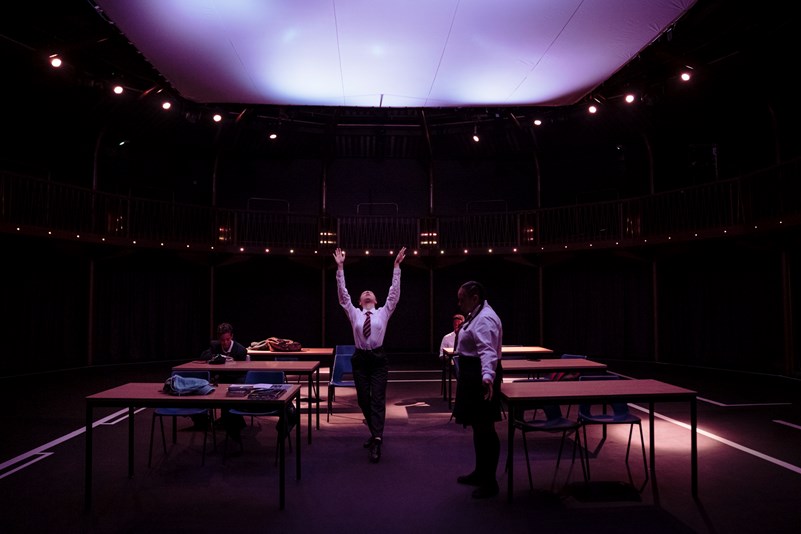
Hidden depth
While Leilah and Aarron seem unbothered by detentions or doing what they’re told, Maisy is a stereotypical ‘nerd’, crushed by the pressure to do well and be the best. She’s mocked by the others, and panics when Leilah takes a photo of herself and Aarron with Maisy in the background, begging her to delete it in case her dad finds out she’s in detention.
Yet, later, her outwardly ‘frigid’ and uptight personality is blown open when she performs a spoken word monologue and dance while the other three characters remain frozen and unseeing. This cleverly demonstrates that every one of us has sexual desires and complicated emotions, whether we share them with others or keep them hidden.
Billy, a transgender student, brings a perspective to the group which propels the play directly into the here and now. Issues like transgender sexuality, deadnaming and pronouns are subjects of evolving conversations – conversations which, often, are driven by young people. Aarron, however, seems to feel threatened and confronted, calling Billy a ‘freak’, unable to get his head around the idea that they are neither male nor female.
Acting beyond their years
Xana’s specially composed soundtrack for the play adds pulsing emotion to the already intense performance and brings the explosive movement to energetic life. All four actors are incredible, embodying teenage anger, frustration and turmoil with the maturity of people who have recently been through it themselves. They’re all young, but they’re not 16, which is a wise casting decision given the need for hindsight and a broader understanding of today’s political and educational agenda.
It’s painful to watch how overwhelming our emotions can be, especially when we don’t fully understand or know what to do with them. The use of coloured lights, loud music, flashes, and fast camera shots to portray each time one of the characters feels particularly strong emotions is almost unbearable, but brilliantly effective. Some students may struggle to discuss these parts in class, but they will almost certainly think about them in the safety of their own space.
This is probably the case with a lot of the play, especially as many students will have first-hand experience of the issues explored and may even feel triggered by mentions of consent, panic attacks, overdoses, sexuality, and other issues. Of course, difficult questions must be asked, and young people are resilient, but this play is not an easy watch.
Having said this, it is laugh-out-loud funny. It’s funny like Netflix’s Sex Education is funny, highlighting the agonising awkwardness of being a teenager, the sharp wit of young people, and the utter ridiculousness of the current sex education curriculum.
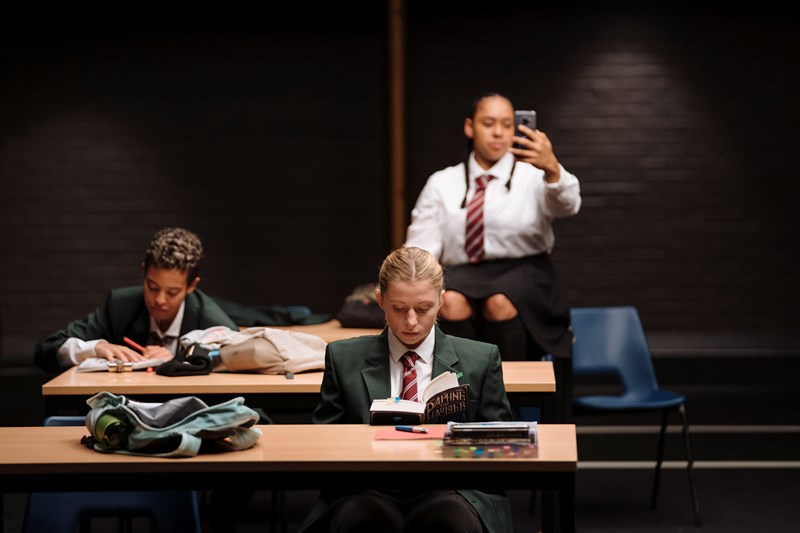
Time to change
Towards the end of the play, the characters deliver the speech they’ve written. ‘It’s time to change’, they say. This mess ‘could have been prevented if we’d all been better educated.’ Laying out exactly what needs to be done through powerful spoken word, they present a brighter looking future for young people in schools.
They’re not, however, accusing the ‘overworked, underpaid teachers’. Instead, they’re talking about systemic change that must now, it seems, be driven by young people. Watching Birds and Bees, students will feel empowered to speak out, to make change happen, to do anything but simply accept things as they are.
Birds and Bees is recommended for ages 14+. The digital schools package is available to book now, and includes unlimited access to the Birds and Bees film until the end of summer term 2021.
The production is an opportunity for GCSE Drama students to fulfil their 'Live Theatre Production' evaluation and review.
For state schools, the price of the recorded live performance is the equivalent to £4.90 per student (based on 100 students, price per head drops if shared across year groups/subjects):
£490: State secondary schools
£440: State secondary schools with Pupil Premium Eligibility (PPE) of 40% or above
£740: Independent schools
The schools pack can be downloaded here.
Purchase the digital package here.
All images: Helen Murray
Watch the trailer:


